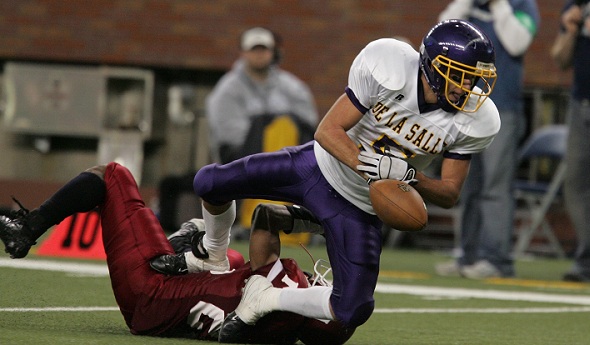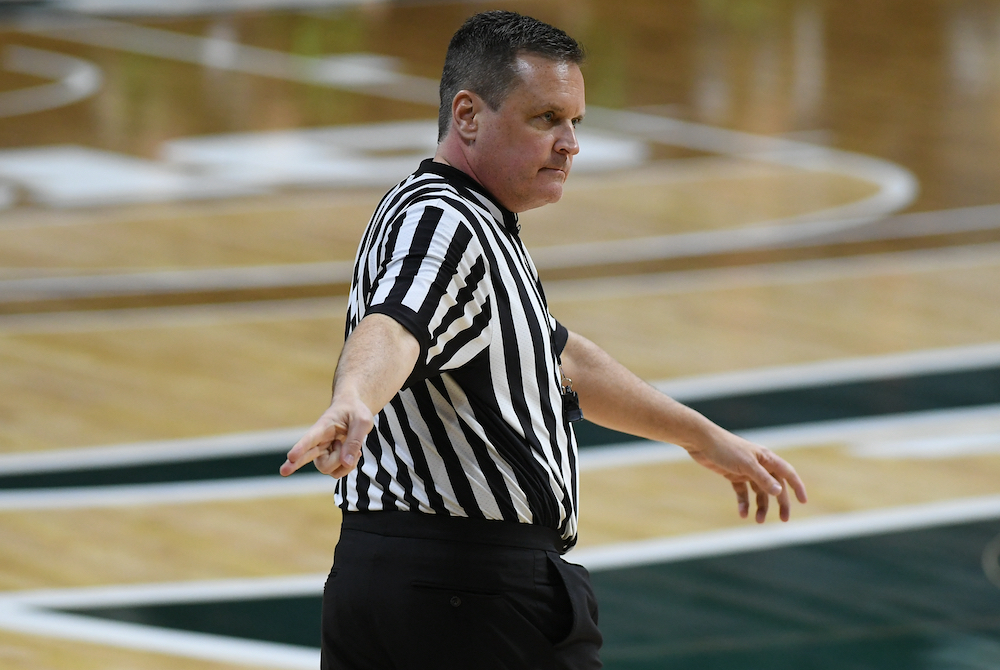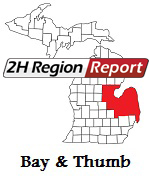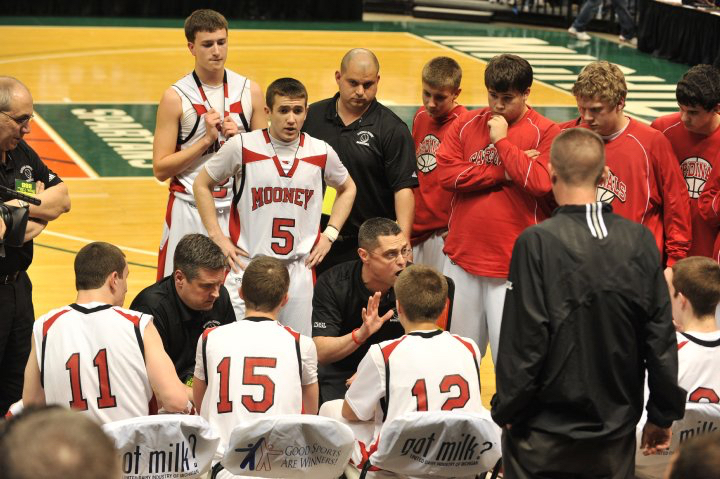
The Right Stuff at the Right Time
October 19, 2012
By Rob Kaminski
MHSAA benchmarks editor
MHSAA Championship history is filled with unforgettable moments for participants and spectators alike. Every now and then, the contest on the biggest stage delivers the cliche’ finish of everyone's dreams: close game, final seconds, trophy on the line, someone’s gotta win, someone’s gotta lose.
For the three teams out there, it’s as exciting as it gets. Yes, three teams. For every classic crunch-time moment, there are officials who have earned the right to share that moment with the participants.
Following, benchmarks reflects on two such moments from the viewpoints of those in stripes.
Ford Field, Detroit, Nov. 24, 2006
Muskegon (13-0) vs. Warren DeLaSalle (11-2)
At Stake: MHSAA Division 2 Football Title
Officials: Referee Charles Sprang (3rd MHSAA Final); Umpire Mike Wallace (1st); Linesman Troy Miller (2nd); Line Judge Reginald Smith (1st); Back Judge Trenton Withrow (1st)
THE MOMENT: DeLaSalle trails 32-30 with time running out, when QB Brian Lewis completes a slant pass to Don Fowler. Fowler is into the clear and headed for the end zone when he is hit by Muskegon’s Ronald Johnson at the 4-yard line, and stretches for the end zone. The ball pops loose, Fowler’s knee goes down, and Muskegon’s Bobby Miller recovers the ball in the end zone within a few furious seconds. The Big Reds get the ball, the undefeated season, and the championship.
Withrow: “They were in a hurry-up on the last drive and the game, which was fast-paced the entire time, got even faster. When the receiver got into the open, I knew I had to get back to the goal line and keep my eyes on the play. That was the first thing on my mind; if I don’t get to the goal line, I can’t make that call.
“Immediately after I made the call (correctly, a fumble and touchback), I just remember chills down my spine, the DeLaSalle kids trying to argue that he was down, and hoping I got it right. We don’t have the luxury of replay. It was a bang-bang call; knee coming down, lost ball, goal line right there.”
Smith: “As the play took place, I was telling myself not to rush, but be precise in my call. Just move in to box the play with Trent and watch for the ball at all times as the play developed.”
Sprang: “I did not see the fumble as I was about 60 yards up field. I got to Trent and said, ‘What do you have?’ Trent said, ‘Touchback.’ Mike Wallace asked, ‘Are you sure?’ Trent never wavered and said, ‘He never got in the end zone with the ball. It was out at the 1.’ I asked again, ‘Are you sure?’ Trent said, ‘No doubt.’ Trent, as I saw on film, was in perfect position. That call was the game and he nailed it.”
Miller: “It was great that Reggie and Trent spent very little time communicating and they had the same ruling. Being on the Warren DeLaSalle sideline, I explained to the head coach what we had and there was really no reaction, as I believe he saw exactly what Trent had seen, and knew that Trent was in great position.”
Wallace: “I just remember seeing the play from a distance as I was the umpire. I saw the call and just said to myself, ‘I hope that was the right call.’ I didn't have any doubt, but just didn't want a call missed at that point in the game. The call was so smooth, as if he had made the call a hundred times.
 “Moments afterward I just remember telling him ‘That was a heck-of-a-call,’ and I was not even sure if he got it right or not.”
“Moments afterward I just remember telling him ‘That was a heck-of-a-call,’ and I was not even sure if he got it right or not.”
Withrow: “I’ll never forget when Mike came running down the field, he said, ‘That’s why I’m glad I’m the umpire; so I don’t have to make that call.’
“Chuck and I discussed it, and he just wanted to make sure of what I saw; I told him exactly what happened, and then he repeated the signal.”
Sprang: “At every opportunity, we talked about ‘staying in the game.’ Muskegon had a two touchdown lead twice in the game and DeLaSalle fought back each time to either tie or go ahead. I am not sure if Mike Wallace had a crystal ball, but he said, ‘One play is gonna win this game, be ready.’”
Miller: “I remember walking up the tunnel going back to the locker room and walking past a reporter from one of the Detroit papers and having him say, ‘Nice job guys, that was a great call.’”
Sprang: “I knew at that point Trent had it right and the replay only confirmed it. When I saw the replay, it sure was a great feeling to see that ball pop out at the 1-yard line and Trent on the goal line with his bean bag. He made four other guys on the field that day look very, very good.”
Withrow: “Looking at the replay, I was surprised my bean bag came out, because I didn't remember that during the play. It’s a reaction, and I just relied on mechanics. If you do all the right things mechanically, you’ll be in position to make the calls, and it certainly paid off at that moment.”
Wallace: “In the locker room it felt like we just went 15 rounds with Apollo Creed and we were still standing. We knew that we all worked hard, concentrated and nailed it. Maybe it was just that one call, but it was an incredible feeling of success that you strive for when you officiate.”
Breslin Center, East Lansing, March 27, 1999
Muskegon Western Michigan Christian (25-2) vs. Detroit City (22-3)
At Stake: MHSAA Class D Boys Basketball Title
Officials: Dick Kalahar (4th MHSAA Boys Final), Mike Robillard (2nd), Tim Belt (1st)
THE MOMENT: Game tied, clock ticking down, as Muskegon Western Michigan Christian’s Nick Bultema uses a screen and goes airborne to launch a last-second three-point shot. The ball is tipped by Detroit City’s Michael Williams, but momentum takes his body into Bultema’s before the shooter reaches the floor. Foul. 0:00 on the clock. Bultema makes the second free throw, and secures the title.
Kalahar: “I was the trail official, and as the clock was winding down I was looking for a three-point shot, as Detroit City’s defense on the inside was very good. As the player (Bultema) attempted the shot, a very big Detroit City player tried to block the shot. The WMC shooter was still in the air after releasing the ball, when the Detroit City player contacted the shooter and drove him into the table at press row.
 “I made a foul call on the Detroit City player just before the horn went off. Before I went to the table to report the foul, I met with Mike and Tim to confirm the foul was called before time ran out. We all agreed there would be three shots given to the WMC player.”
“I made a foul call on the Detroit City player just before the horn went off. Before I went to the table to report the foul, I met with Mike and Tim to confirm the foul was called before time ran out. We all agreed there would be three shots given to the WMC player.”
Robillard: “I knew going into the game I was with two outstanding officials, and we would handle any situations that might occur. As the game was getting into the final minutes I was hoping for overtime because both teams had competed so hard and the game had such a great flow.”
Kalahar: “I reported the foul and explained to the table what we were going to do. I also called both head coaches together to explain what the call was and how we would proceed. Both coaches were gentlemen.”
Robillard: “As the end of the game approached, our crew communication was outstanding. We knew we had to be out on the perimeter and protect the shooters. So when the left-handed shooter pulled up behind the three-point arc, both Dick and I had him booked in. It was Dick's primary, but I was doubling back to protect the backside of the shooter. As soon as the defender ran into the shooter, Dick nailed the whistle.”
Kalahar: “Experience always helps. Trying to anticipate what might happen as well as good concentration in a game like this comes with experience. Having two good partners is also a key.
“As we entered the locker room, much to my surprise, Jack Roberts, Nate Hampton and Tom Minter of the MHSAA office were there. I will always remember their support. Our crew then talked about the game, and felt we gave the teams a good game. Mike or Tim told me they thought the last call took courage and they were proud to be a part of this crew.
“I had some very anxious moments the first time I saw the replay. As officials, we always want to get the call right, especially in a game like this. I've seen it many times, and to this day I believe the right and fair call was made.”
PHOTOS: (Top) Warren DeLaSalle's Don Fowler loses control of the ball just before reaching the goalline during the 2006 Division 2 Final at Ford Field. (Middle) Muskegon Western Michigan Christian's Nick Bultema is about to be engulfed by a teammate moments after sinking the winning free throw during the 1999 Class D Final at the Breslin Center.
NOTE: This is the fourth installment in the series "Making – and Answering – the Call" detailing the careers and service of MHSAA officials. Click the links below to view the others.

Former Cardinal Mooney Coach Earns Breslin Return as Official
By
Paul Costanzo
Special for MHSAA.com
March 31, 2022
Jim McAndrews felt anxious and excited both times he was on the floor during basketball Finals weekend at the Breslin Center.
 But those feelings were a bit different as an assistant coach at Marine City Cardinal Mooney in 2010 than they were as a referee this year.
But those feelings were a bit different as an assistant coach at Marine City Cardinal Mooney in 2010 than they were as a referee this year.
“It was different because I was worried about myself (as a referee) versus having to worry about high school kids and not making a mistake to screw it up for them (as a coach),” McAndrews said. “This was a little less pressure than that. With refereeing, you kind of just worry about yourself.”
McAndrews served as the head official in the Division 2 Girls Semifinal between Grand Rapids West Catholic and Detroit Country Day on March 18. That Breslin appearance came 12 years after he was an assistant for his brother, Mike McAndrews, during Mooney’s runner-up run in Class D boys in 2010.
He also coached with his sister, Susan Everhart, who led the Mooney girls to the Semifinals in 2008 and a runner-up finish in 2009. Those tournaments ended at Eastern Michigan University, but all of them gave him a rare look at the experience from two very different angles.
“I wasn’t walking in blindly,” McAndrew said. “I think what helps me in my officiating duties is having been there and knowing what the coaches are expecting and what they need. I think that helps me to communicate things to them. Being (at Breslin as a coach) and seeing that helped.”
McAndrews has been reffing since leaving his brother’s staff in 2011. That ended a long run in coaching which started in 1989 when he was an assistant coach at Mooney under Dave Jackson. After one season in that role, he took over the program and coached the Cardinals for a decade. That included coaching his brother, who he would later coach with for another eight years.
It didn’t even take a full season for him to get back on the court, albeit in a different role, after leaving the coaching ranks.
“I missed the game,” Jim McAndrews said. “Refereeing gives you an opportunity to get your competitive juices going a little bit. You get a little exercise, and the relationships you get to make are amazing. There’s nothing like being in the gym and talking hoops with other like-minded people: junkies. Basketball junkies. It’s a community, and it’s a really good community. We all want good stuff for the kids, and we want to help out. Plus, I enjoy seeing the local talent.”
 McAndrews, whose full-time job is in automotive supply sales, refs mostly in the Metro Detroit area and the Thumb, working games in the Catholic League, Macomb Area Conference and Blue Water Area Conference.
McAndrews, whose full-time job is in automotive supply sales, refs mostly in the Metro Detroit area and the Thumb, working games in the Catholic League, Macomb Area Conference and Blue Water Area Conference.
Being a referee has not only allowed him to stay in the game and the high school basketball community, but it’s also introduced him to new people who have the same love for the game.
“This community really is special,” he said. “We’re not in it to get rich. We’re in it because we’re passionate about the game.”
This year’s Semifinal was his first, and he was joined on the court by Jerry Armstrong and Douglas Richardson. It was the trio’s first time together.
“That can be part of the challenge,” McAndrews said. “You have to be able to adapt to other people’s way of doing things that you’ve never met before. That’s part of it. It’s about officiating the game as well as challenging yourself.”
Another challenge of refereeing during Finals weekend is the increase of eyes on the game, and the extra pressure that can bring.
“In this particular case, it was my first time (reffing) on TV,” McAndrews said. “There’s commentators with replays, and there are different responsibilities in regard to timeouts. There was a little anxiety. I said to my partners that I’m just going to try to smile, be in the moment and enjoy it, because it’s been a crazy couple years. But your peers are watching, other referees are watching, and they’ll let you know if you miss something.”
The game went off without any issues, and the experience ended up being even better than McAndrews expected, as his kids were able to be on the court with him.
“It was fantastic,” he said. “I can’t think of a better word for it. My family was able to get involved, and we had first-class accommodations. My kids were able to be the ball boy and the water guy for me, so this wasn’t just for me. We were very appreciative of it all, and it was really, really fun.”
 Paul Costanzo served as a sportswriter at The Port Huron Times Herald from 2006-15, including three years as lead sportswriter, and prior to that as sports editor at the Hillsdale Daily News from 2005-06. He can be reached at [email protected] with story ideas for Genesee, Lapeer, St. Clair, Sanilac, Huron, Tuscola, Saginaw, Bay, Arenac, Midland and Gladwin counties.
Paul Costanzo served as a sportswriter at The Port Huron Times Herald from 2006-15, including three years as lead sportswriter, and prior to that as sports editor at the Hillsdale Daily News from 2005-06. He can be reached at [email protected] with story ideas for Genesee, Lapeer, St. Clair, Sanilac, Huron, Tuscola, Saginaw, Bay, Arenac, Midland and Gladwin counties.
PHOTOS (Top) Jim McAndrews works this season’s Division 2 Semifinals between Grand Rapids West Catholic and Detroit Country Day. (Middle) McAndrews, kneeling lower left, serves as an assistant coach during Cardinal Mooney’s run to Breslin in 2010. (Top photo by Hockey Weekly Action Photos; middle courtesy the McAndrews family.)

